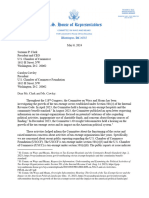0 ratings0% found this document useful (0 votes)
30K viewsLetter to Grant Applicants_final
The U.S. Department of Transportation (DOT) emphasizes that recipients of its financial assistance must comply with all applicable Federal laws, including those prohibiting discrimination based on race, sex, and religion. The letter outlines the legal obligations of recipients, including cooperation with Federal immigration enforcement, and warns that noncompliance may result in loss of funding. DOT is committed to ensuring accountability and integrity in its programs and offers support to help recipients meet their legal responsibilities.
Uploaded by
Breitbart NewsCopyright
© © All Rights Reserved
Available Formats
Download as PDF or read online on Scribd
0 ratings0% found this document useful (0 votes)
30K viewsLetter to Grant Applicants_final
The U.S. Department of Transportation (DOT) emphasizes that recipients of its financial assistance must comply with all applicable Federal laws, including those prohibiting discrimination based on race, sex, and religion. The letter outlines the legal obligations of recipients, including cooperation with Federal immigration enforcement, and warns that noncompliance may result in loss of funding. DOT is committed to ensuring accountability and integrity in its programs and offers support to help recipients meet their legal responsibilities.
Uploaded by
Breitbart NewsCopyright
© © All Rights Reserved
Available Formats
Download as PDF or read online on Scribd
You are on page 1/ 4
THE SECRETARY OF TRANSPORTATION
WASHINGTON, DC 20590
~~
@:
oy
April 24, 2025
To Alll Recipients of U.S. Department of Transportation Funding:
‘The U.S, Department of Transportation (Department or DOT) distributes substantial Federal fi-
nancial assistance for thousands of projects, programs, and activities operated or initiated by
verse entities, ineluding but not limited to State and local governments. The Department admin-
{sters this Federal financial assistance to support the development and maintenance of the Na-
tion’s transportation infrastructure, pursuant to statutory authority and in accordance with bind-
ing contractual agreements in the form of Federal financial assistance agreements, usually grants,
cooperative agreements, and loans. Accordingly, | write to clarify and reaffirm pertinent legal re-
quirements, to outline the Department's expectations, and to provide a reminder of your respon-
sibilities and the consequences of noncompliance with Federal law and the terms of your finan-
cial assistance agreements. It is the policy of the Department to award and to continue to provide
Federal financial assistance only to those recipients who comply with their legal obligations.
As recipients of such DOT funds, you have entered into legally enforceable agreements with the
United States Government and are obligated to comply fully with all applicable Federal laws and
regulations. These laws and regulations include the United States Constitution, Federal statutes,
applicable rules, and public policy requirements, including, among others, those protecting free
speech and religious liberty and those prohibiting discrimination and enforcing controls on ille-
gal immigration. As Secretary of Transportation, I am responsible for ensuring recipients of DOT
financial assistance are aware of and comply with all applicable legal obligations.
‘The Equal Protection principles of the Constitution prohibit State and Federal governmental enti-
ties from discriminating on the basis of protected characteristics, including race. Indeed, as the
Supreme Court declared in Students for Fair Admission, Inc. v. Harvard (SFFA), 600 U.S. 181,
206 (2023), “{t]he clear and central purpose of the Fourteenth Amendment was to eliminate all
official state sources of invidious racial discrimination in the States.” The Court further noted
that “[ojne of the principal reasons race is treated as a forbidden classification is that it demeans
the dignity and worth of a person to be judged by ancestry instead of by his or her own merit and
essential qualities.” /d. at 220. In ruling that race-based admissions programs at universities vio-
lated the Equal Protection Clause, the Court made clear that discrimination based on race is, has
been, and will continue to be unlawful, except in rare circumstances. /d. at 220-21. Similarly,
sex-based classifications violate the Equal Protection Clause absent “exceedingly persuasive”
justification. See United States v. Virginia, 518 U.S. 515, 533 (1996).
Page 2
‘These constitutional principles are reinforced by the Civil Rights Act of 1964, which prohibits
discrimination based on protected characteristics in the Federal funding and employment con-
texts in Title VI (42 U.S.C. § 2000d er seq.) and Title VII (42 U.S.C. § 2000e-2), as well as the
applicable non-discrimination clauses in the Federal Aid Highway Act of 1973 (23 U.S.C. §§ 140
and 324 ef seq.), the Airport and Airway Improvement Act of 1982, (49 U.S.C. § 47123), and Ti-
tle IX of the Education Amendments of 1972, as amended (20 U.S.C. § 1681 ef seq.).
Based on binding Supreme Court precedent and these Federal laws, DOT is prohibited from dis-
criminating based on race, color, national origin, sex, or religion in any of its programs or activi-
ties. Moreover, because DOT may not establish, induce, or endorse prohibited discrimination in-
directly,' it must ensure that discrimination based on race, color, national origin, sex, or religion
does not exist in the programs or activities it funds or financially assists.
These same principles apply to recipients of Federal financial assistance from DOT, as both a
matter of Federal law and by virtue of contractual provisions governing receipt of DOT funding.
Accordingly, DOT recipients are prohibited from engaging in discriminatory actions in their own
policies, programs, and activities, including in administering contracts, and their employment
practices.
Whether or not described in neutral terms, any policy, program, or activity that is premised on a
prohibited classification, including discriminatory policies or practices designed to achieve so-
called “diversity, equity, and inclusion,” or “DEI,” goals, presumptively violates Federal law. Re-
cipients of DOT financial assistance must ensure that the personnel practices (including hiring,
promotions, and terminations) within their organizations are merit-based and do not discriminate
based on prohibited categories. Recipients are also precluded from allocating money received
under DOT awards—such as through contracts or the provision of other benefits—based on sus-
pect classifications. Any discriminatory actions in your policies, programs, and activities based
‘on prohibited categories constitute a clear violation of Federal law and the terms of your grant
agreements.
In addition, your legal obligations require cooperation generally with Federal authorities in the
enforcement of Federal law, including cooperating with and not impeding U.S. Immigration and
Customs Enforcement (ICE) and other Federal offices and components of the Department of
Homeland Security in the enforcement of Federal immigration law. DOT has noted reported in-
stances where some recipients of Federal financial assistance have declined to cooperate with
ICE investigations, have issued driver’s licenses to individuals present in the United States in vi-
lation of Federal immigration law, or have otherwise acted in a manner that impedes Federal
Jaw enforcement. Such actions undermine Federal sovereignty in the enforcement of immigration
law, compromise the safety and security of the transportation systems supported by DOT
' See SFFA, 600 U.S. at 230; Norwood v. Harrison, 413 U.S. 455, 465 (1973).
Page 3
financial assistance, and prioritize illegal aliens over the safety and welfare of the American peo-
ple whose Federal taxes fund DOT’s financial assistance programs.
‘Under the Constitution, Federal law is “the supreme Law of the Land,” U.S. Const. Art. VI. That
means that where Federal and State legal requirements conflict, States and State entities must
follow Federal law. Declining to cooperate with the enforcement of Federal immigration law or
otherwise taking action intended to shield illegal aliens from ICE detection contravenes Federal
law and may give rise to civil and criminal liability. See 8 U.S.C. § 1324 and 8 U.S.C. § 1373.
Accordingly, DOT expects its recipients to comply with Federal law enforcement directives and
to cooperate with Federal officials in the enforcement of Federal immigration law. The Depart-
‘ment also expects its recipients to ensure that the Federal financial assistance they receive from
DOTis provided only to subrecipients, businesses, or service providers that are U.S. Citizens or
U.S. Nationals and Lawful Permanent Residents (LPRs) or legal entities allowed to do business
in the U.S. and which do not employ illegal aliens.
This letter provides notice of the Department's existing interpretation of Federal law. The De-
partment will vigorously enforce the law on equal terms as to all its recipients and intends to take
appropriate measures to assess their compliance based on the interpretation of Federal law set
forth in this letter. Adherence to your legal obligations is a prerequisite for receipt of DOT finan-
cial assistance. Noncompliance with applicable Federal laws, or failure to cooperate generally
with Federal authorities in the enforcement of Federal law, will jeopardize your continued receipt
of Federal financial assistance from DOT and could lead to a loss of Federal funding from DOT.
The Department retains authority, pursuant to its oversight responsibilities and the terms of your
agreements, to initiate enforcement actions, such as comprehensive audits and possible recovery
of funds expended in a manner contrary to the terms of the funding agreement. DOT may also
terminate funding in response to substantiated breaches of the terms of the agreement, or if DOT
determines that continued funding is no longer in the public interest. These steps, within DOT's
discretion, are intended to ensure accountability and protect the integrity of Federal programs.
To assist grant recipients in meeting their legal obligations, DOT offers technical guidance and
support through its program offices. Should you require clarification regarding your obligations,
‘you are encouraged to contact your designated DOT representative promptly. Proactive engage-
ment is strongly advised to prevent inadvertent noncompliance.
Page 4
DOT remains committed to advancing a transportation system that serves the public interest effi-
ciently and unleashes economic prosperity and a superior quality of life for American families.
This mission depends upon your strict adherence to the legal framework governing our partner-
ship, and I trust you will take all necessary steps to comply with Federal law and satisfy your le-
gal obligations.
Sincerely,
~€ POA S
Sean P. Dufly
You might also like
- The Subtle Art of Not Giving a F*ck: A Counterintuitive Approach to Living a Good LifeFrom EverandThe Subtle Art of Not Giving a F*ck: A Counterintuitive Approach to Living a Good Life4/5 (6125)
- The Gifts of Imperfection: Let Go of Who You Think You're Supposed to Be and Embrace Who You AreFrom EverandThe Gifts of Imperfection: Let Go of Who You Think You're Supposed to Be and Embrace Who You Are4/5 (1148)
- Never Split the Difference: Negotiating As If Your Life Depended On ItFrom EverandNever Split the Difference: Negotiating As If Your Life Depended On It4.5/5 (932)
- ARCCI Report - Sexual Crimes in The October 7 #Hamas Terrorist Attack82% (11)ARCCI Report - Sexual Crimes in The October 7 #Hamas Terrorist Attack39 pages
- Hidden Figures: The American Dream and the Untold Story of the Black Women Mathematicians Who Helped Win the Space RaceFrom EverandHidden Figures: The American Dream and the Untold Story of the Black Women Mathematicians Who Helped Win the Space Race4/5 (954)
- The Hard Thing About Hard Things: Building a Business When There Are No Easy AnswersFrom EverandThe Hard Thing About Hard Things: Building a Business When There Are No Easy Answers4.5/5 (361)
- The World Is Flat 3.0: A Brief History of the Twenty-first CenturyFrom EverandThe World Is Flat 3.0: A Brief History of the Twenty-first Century3.5/5 (2283)
- The Tarrance Group Nevada Senate Polling Memo April100% (1)The Tarrance Group Nevada Senate Polling Memo April3 pages
- Devil in the Grove: Thurgood Marshall, the Groveland Boys, and the Dawn of a New AmericaFrom EverandDevil in the Grove: Thurgood Marshall, the Groveland Boys, and the Dawn of a New America4.5/5 (278)
- A Heartbreaking Work Of Staggering Genius: A Memoir Based on a True StoryFrom EverandA Heartbreaking Work Of Staggering Genius: A Memoir Based on a True Story3.5/5 (692)
- 2024-07-10 GARMs Harm - How The Worlds Biggest Brands Seek To Control Online Speech100% (1)2024-07-10 GARMs Harm - How The Worlds Biggest Brands Seek To Control Online Speech39 pages
- U.S. Chamber of Commerce Foundation - Full Filing - Nonprofit Explorer - ProPublicaNo ratings yetU.S. Chamber of Commerce Foundation - Full Filing - Nonprofit Explorer - ProPublica43 pages
- 03.27.25 Thune Letter to Lutnick Re BEADNo ratings yet03.27.25 Thune Letter to Lutnick Re BEAD3 pages
- Increasing Organ Transplant Access (IOTA) Model Letter100% (1)Increasing Organ Transplant Access (IOTA) Model Letter2 pages
- 6.18.2024 Letter To The SEC Re Hunter Biden100% (2)6.18.2024 Letter To The SEC Re Hunter Biden4 pages
- 2025.2.4_Senator Ernst Letter to Secretary Rubio[1][2]100% (1)2025.2.4_Senator Ernst Letter to Secretary Rubio[1][2]5 pages
- 05.06.2024 U.S. Chamber of Commerce Letter v4100% (1)05.06.2024 U.S. Chamber of Commerce Letter v43 pages
- Vance Legislation On Chinese International Law Violation Legislation100% (1)Vance Legislation On Chinese International Law Violation Legislation5 pages
- Vance Legislation On Chinese International Law Violations100% (2)Vance Legislation On Chinese International Law Violations5 pages
- The Subtle Art of Not Giving a F*ck: A Counterintuitive Approach to Living a Good LifeFrom EverandThe Subtle Art of Not Giving a F*ck: A Counterintuitive Approach to Living a Good Life
- The Gifts of Imperfection: Let Go of Who You Think You're Supposed to Be and Embrace Who You AreFrom EverandThe Gifts of Imperfection: Let Go of Who You Think You're Supposed to Be and Embrace Who You Are
- Never Split the Difference: Negotiating As If Your Life Depended On ItFrom EverandNever Split the Difference: Negotiating As If Your Life Depended On It
- ARCCI Report - Sexual Crimes in The October 7 #Hamas Terrorist AttackARCCI Report - Sexual Crimes in The October 7 #Hamas Terrorist Attack
- Hidden Figures: The American Dream and the Untold Story of the Black Women Mathematicians Who Helped Win the Space RaceFrom EverandHidden Figures: The American Dream and the Untold Story of the Black Women Mathematicians Who Helped Win the Space Race
- The Hard Thing About Hard Things: Building a Business When There Are No Easy AnswersFrom EverandThe Hard Thing About Hard Things: Building a Business When There Are No Easy Answers
- Elon Musk: Tesla, SpaceX, and the Quest for a Fantastic FutureFrom EverandElon Musk: Tesla, SpaceX, and the Quest for a Fantastic Future
- The Emperor of All Maladies: A Biography of CancerFrom EverandThe Emperor of All Maladies: A Biography of Cancer
- The Yellow House: A Memoir (2019 National Book Award Winner)From EverandThe Yellow House: A Memoir (2019 National Book Award Winner)
- The Little Book of Hygge: Danish Secrets to Happy LivingFrom EverandThe Little Book of Hygge: Danish Secrets to Happy Living
- The World Is Flat 3.0: A Brief History of the Twenty-first CenturyFrom EverandThe World Is Flat 3.0: A Brief History of the Twenty-first Century
- The Tarrance Group Nevada Senate Polling Memo AprilThe Tarrance Group Nevada Senate Polling Memo April
- Devil in the Grove: Thurgood Marshall, the Groveland Boys, and the Dawn of a New AmericaFrom EverandDevil in the Grove: Thurgood Marshall, the Groveland Boys, and the Dawn of a New America
- The Sympathizer: A Novel (Pulitzer Prize for Fiction)From EverandThe Sympathizer: A Novel (Pulitzer Prize for Fiction)
- A Heartbreaking Work Of Staggering Genius: A Memoir Based on a True StoryFrom EverandA Heartbreaking Work Of Staggering Genius: A Memoir Based on a True Story
- Team of Rivals: The Political Genius of Abraham LincolnFrom EverandTeam of Rivals: The Political Genius of Abraham Lincoln
- 2024-07-10 GARMs Harm - How The Worlds Biggest Brands Seek To Control Online Speech2024-07-10 GARMs Harm - How The Worlds Biggest Brands Seek To Control Online Speech
- On Fire: The (Burning) Case for a Green New DealFrom EverandOn Fire: The (Burning) Case for a Green New Deal
- U.S. Chamber of Commerce Foundation - Full Filing - Nonprofit Explorer - ProPublicaU.S. Chamber of Commerce Foundation - Full Filing - Nonprofit Explorer - ProPublica
- Increasing Organ Transplant Access (IOTA) Model LetterIncreasing Organ Transplant Access (IOTA) Model Letter
- 2025.2.4_Senator Ernst Letter to Secretary Rubio[1][2]2025.2.4_Senator Ernst Letter to Secretary Rubio[1][2]
- Vance Legislation On Chinese International Law Violation LegislationVance Legislation On Chinese International Law Violation Legislation
- Vance Legislation On Chinese International Law ViolationsVance Legislation On Chinese International Law Violations
- The Unwinding: An Inner History of the New AmericaFrom EverandThe Unwinding: An Inner History of the New America






































































